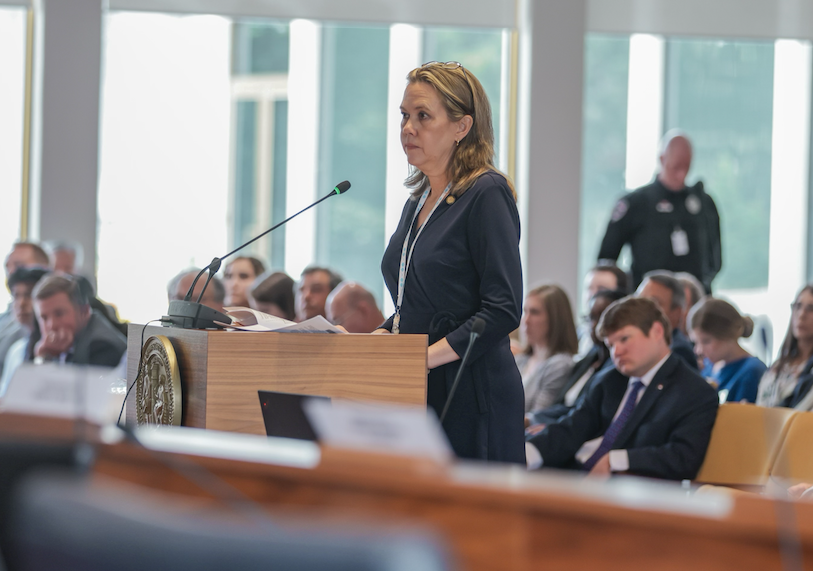North Carolina Gov. Roy Cooper vetoed three bills Wednesday involving transgender women playing in women’s sports, gender transitioning in children, and parental rights, which he likened to Florida’s Parental Rights in Education Act, dubbed the “Don’t Say Gay” Act.
“For campaign purposes only, Republicans are serving up a triple threat of political culture wars using government to invade the rights and responsibilities of parents and doctors, hurting vulnerable children and damaging our state’s reputation and economy like they did with the harmful bathroom bill,” he said in a press release. “Instead of scheming for the next election, Republicans should get to work investing in our public schools and teachers, lowering the cost of living and creating more stability for middle-class families.”
Passage of H.B. 574, Fairness in Women’s Sports Act, S.B. 49, Parents Bill of Rights, and H.B. 808, Gender Transition/Minors through the North Carolina General Assembly this session have also received national attention.
Critics call the bills “Anti-LGBTQ rights.”
H.B. 574 bans biological males from participating in competitive sports designated for biological females at N.C. public schools, ranging from middle school to universities. The bill also determines a student athlete’s gender classification based on their sex at birth rather than their gender identity.
However, some exceptions are made for female athletes as women can compete in sports designated for males as long as there is “no comparable female team and the sport is not wrestling.”
Other Republican-dominated state legislatures have undertaken similar measures in recent years, motivated by the controversy surrounding transgender females competing in women’s sports.
The Senate passed the bill on June 20, and the House voted to concur on June 22.
“We don’t need politicians inflaming their political culture wars by making broad, uninformed decisions about an extremely small number of vulnerable children that are already handled by a robust system that relies on parents, schools and sports organizations,” Cooper, a Democrat, said about the bill. “Republican governors in other states have vetoed similar bills because they hurt their states’ reputation and economy and because they are neither fair nor needed.”
Senate Republicans issued statements on the vetoes in a press release.
Sen. Vickie Sawyer,R-Iredell, said there are inherent biological differences between men and women.
” We’ve already seen the impacts of allowing biological men to play against biological women in North Carolina and across the United States,” she said responding to Cooper’s veto. “International athletic governing bodies are beginning to put guardrails in place to ensure fair competition, and we need to do the same. Gov. Cooper has no interest in supporting female athletes, only his far-left donors that want to erase women by refusing to acknowledge biology.”
The controversy reached a fever pitch after Lia Thomas, a transgender female who attended the University of Pennsylvania, won a 2022 NCAA National Championship in the women’s 500-yard freestyle swimming event. Thomas had earlier competed on the university’s men’s swim team before transitioning in 2020.
Female Kentucky swimmer Riley Gaines placed second to Thomas in the national championship and spoke to North Carolina lawmakers this spring in support of the Fairness in Women’s Sports Act.

Payton McNabb of Cherokee County also testified about her experience in a Hiwassee High School volleyball game where a transgender athlete critically injured her.
Nearly 30 other states have passed or enacted legislation prohibiting transgender females from competing in women’s sports.
However, courts have prevented some states, such as Idaho, from enacting the bans after individuals issued lawsuits challenging them, claiming they violate the U.S. Constitution.
H.B. 808 would prohibit state funds from being used for certain medical procedures and treatments related to gender transition for individuals under 18. This includes surgical procedures and the prescription, provision, or distribution of drugs that block puberty or alter hormonal levels in minors.
Additionally, the bill allows impacted minors to bring civil action within a 25-year window.
“This bill is about protecting children and teenagers from decisions that have life-changing, permanent impacts,” Sen. Joyce Krawiec, R-Forsyth, said.
It passed in the Senate on June 27 before passing in a concurrence vote in the House the next day.
“A doctor’s office is no place for politicians, and North Carolina should continue to let parents and medical professionals make decisions about the best way to offer gender care for their children,” Cooper said. “Ordering doctors to stop following approved medical protocols sets a troubling precedent and is dangerous for vulnerable youth and their mental health. The government should not make itself both the parent and the doctor.”
Krawiec responded to Cooper’s veto of the bill.
“The open-door policy of allowing children to permanently change their gender is reckless, and rightfully questioned by the medical community,” she said. “Several countries are now restricting gender-reassignment procedures for minors, citing long-term consequences and permanent risks. While Gov. Cooper has turned a blind eye to the protection of children, the legislature is taking the safest approach by limiting access to these life-altering medical procedures until a child comes of age.”
S.B. 49 would affirm a set of parental rights, including the right to direct the education of their child and access to healthcare records. The measure also establishes a parent’s right to request information about what their child is learning in school, including lessons, textbooks, tutoring services, and other details about how their child and their school are operating.
Parents would additionally be informed of any healthcare services their child receives, including any changes to their child’s physical or mental health and whether their child requests a change in their name or pronouns.

The House passed it on June 28, and the Senate voted to concur the next day.
“Parents are the most essential educators for their children and their involvement must be encouraged, but this bill will scare teachers into silence by injecting fear and uncertainty into classrooms,” Cooper stated. “This “Don’t Say Gay” bill also hampers the important and sometimes lifesaving role of educators as trusted advisers when students have nowhere else to turn. The rights of parents are well established in state law, so instead of burdening schools with their political culture wars, legislators should help them with better teacher pay and more investments in students.”
Sens. Amy Galey, R-Alamance and Michael Lee, R-New Hanover said parents know what is best for their children.
“Gov. Cooper continues to mislead the public about the Parents’ Bill of Rights so he can drum up manufactured outrage and rake in donations,” they said. “This bill encourages collaboration, promotes transparency, and keeps classrooms focused on educating, not indoctrinating. The Democrats and Gov. Cooper think the government can co-parent, but Republicans will always stand strong to defend parents and families.”
Cooper’s vetoes will most likely be overridden, as they have been this session, as Republicans hold a supermajority in the General Assembly.
Alex Baltzegar, David Bass, and Grant Lefelar contributed to this article.